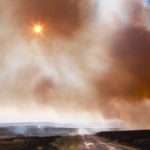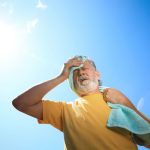
Two out of three Australians use at least one form of Pharmaceutical Benefits Scheme (PBS) medicine, with more than 300 million prescribed medicines given in 2020 to 2021.
So when a natural disaster strikes — such as a bushfire, floods or cyclones — the way people manage their medicines and medical devices is a big deal to their health. Natural disasters may result in shortages of medication, so it’s important to get prepared if you can.
Some people with diabetes can’t survive without insulin, for example, while many people with asthma or COPD rely on salbutamol. Then there are antiepileptic medications, antidepressants, hormonal contraception, statins, ACE inhibitors, metformin and many more.
You could fill a filing cabinet with the list of medicines that are essential to millions of Australians.
Here are key tips to remember if you, or someone in your family, depend on medicines and become faced with a natural disaster.
Plan to take your medicines with you
If there’s time and it’s safe to do so, pack your medicines, prescriptions, healthcare cards (for example, your Medicare card) and your doctor’s contact details — but do not grab them if it puts you in danger.
Since a natural disaster can panic even the calmest person, it pays to have a pre-prepared emergency survival plan, such as the Red Cross RediPlan. Sit down with the people in your household to plan for an emergency well before disaster strikes.
If you have diabetes, you can also create an emergency plan here. Share your plan with your family or neighbours, particularly if you’re mobility impaired.
Consider storing your medicines and health information on the NPS MedicineWise app.
Keep refrigerated medicines cold
Some medicines need to get stored in a fridge (between 2 to 8 degrees Celsius), including:
- vaccines
- insulin
- levothyroxine
- immune therapies
- some eye drops
- some hormone-based medicines
- some antibiotic medicines for children
If your medicines are normally refrigerated and become unrefrigerated for a while, ask your doctor or pharmacist whether you need to throw them out and replace them.
Medicines contaminated by floodwater
Throw out any medicines that get contaminated by floodwater. Food, liquids or medicines that have come into contact with contaminated floodwater can make you ill.
Floodwater is often polluted by sewage or agricultural and industrial wastes and chemicals. Contaminated water and mud can increase the risk of infections such as such as leptospirosis, diarrhoea, conjunctivitis, and ear, nose and throat infections.
How to get medicines without a prescription
So, if you don’t have your medicines or can’t take them because they get compromised, what do you do?
- If you need medicine and don’t have a prescription, you can make a telehealth appointment (via phone or video call) with your doctor and receive an electronic prescription via SMS or email. You can then take it to your pharmacy or send it to them. You can also forward the prescription to a family member or carer who can collect the medicine for you from the pharmacy. For home delivery, you can forward the SMS or email to a pharmacy so they can scan it.
- If you can’t get an appointment with your doctor, you can use a medical deputising service in your state. This service allows you to book an appointment with a doctor when your regular one isn’t available.
- If you don’t have a prescription and you can’t contact your doctor, a pharmacist may be able to give you a 3-day supply of medicine. This applies if you get affected by a natural disaster and the pharmacist believes you’re in urgent need of that medication, but not all drugs can be given in this way.
- If there’s a shortage of the medicine that you need, speak to your doctor or pharmacist. They may be able to give you an alternative medicine or new treatment option or help you access your usual medicine another way.



